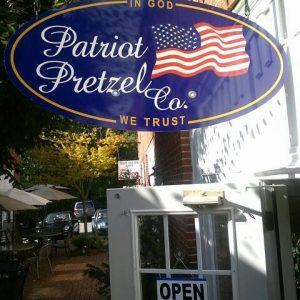The Moravian Music Foundation preserves, shares, and celebrates Moravian musical culture…
With this post I welcome my first “guest blogger” — the Rev. C. Riddick Weber, who has written about his experiences in writing hymns. Thank you, Riddick, for allowing us to use part of your writings about your writings!
Reflections on Writing Hymns:
An Encouragement to Potential Authors
I did not like English class for most middle school or high school, particularly anything related to my having to write, but most especially I disliked writing poetry. However, during my last year in high school, I began to understand what my English teachers were saying as they dug into the words, especially the wordplay in poetry. By college, I could no longer say I did not like my English classes, but still did not enjoy the process of writing.
Soon after finishing college, I began working for the Southern Province as the Director of College-Age Ministry. Over time I became more comfortable with writing, mostly newsletter articles and the occasional sermon as a guest preacher. I was 30 when our first son, Isaac, was born, followed two years later by JC and Daniel, and I found that after we started having kids, I also started having words. All of which is to say, writing hymns did not come easily or quickly to me (you may feel the same way).
I do not consider myself a songwriter. Words and sometimes phrases come to mind as I think about a particular situation. Often I become aware of the first line of a tune that I already know that fits the words that have come to mind. The meter of that song then helps the words to flow, or helps me realize I need to change the wording to get the stress and number of syllables correct. Normally within a half an hour, a song has appeared in good draft form.
For me, it is then important to share those songs with others who I know are hymn writers or have a way with words. I solicit their suggestions relating to the song in general, but I especially point out lines or phrases where I had problems with words, or where they still do not seem quite right to me. I do this for several reasons. First, I find that friends often easily find solutions to wording that seems problematic or forced to me. Secondly, sometimes my mind tricks me into reading through problems with the meter, thus overlooking them. I do not catch these problems, but friendly readers do. Sometimes I take these friends’ suggestions as they are; other times I continue to work with them, revising their revisions. Sometimes, even though I value part of the suggestion, I choose not to accept that because a different concern might outweigh it. Often when I choose not to accept a suggestion, it is because the suggestion misses a theological nuance I am trying to convey.
I would like to share a series of stories about the creation of songs, with the hope that they might inspire others to write words that might come to them.
“I’m Making All Things New,” 2010
Sing to the Lord A New Song, #62
“I’m making all things new,” God says for us to hear.
The old is gone the new is coming ever near.
So we give thanks, our heartfelt thanks, for these past days of prayer and praise.
We’ve heard your call anew; we’ve read and we have prayed
to op’n our heart and minds to sense the new you’ve made.
And now we plead, may we find faith to follow you where’re you lead.
And now make us new, too; please make us one in you.
Draw us together through your Spirit by your pow’r.
So we may be the church you want to minister this very hour.
Christ calls us and we are! You make us and we’re new!
We live and move alone by grace that comes from you.
Let us take cheer! And standing at the ready be when you appear.
© C. Riddick Weber
July 22, 2010
I jokingly say that this was a failed assignment for writing a prayer. I was on the team that planned the devotions for the 2010 Synod, which had “Behold, God Is Making All Things New” for its theme. Rev. Russ May asked me to write an opening prayer as part of the introduction to the devotional booklet that would go out to delegates to help them prepare for synod. After sitting down at my desk and getting nowhere with the prayer, the phrase “I’m making all things new” came to mind. Even though the song does not stay there, starting things from God’s perspective seemed to open the door. Very quickly, too, the tune “Darwall” came into my head, giving me structure for the words. Words flowed very quickly and probably within half an hour the song was finished.
“Love of God is a Fragrant Garden,” 2011
Sing to the Lord A New Song, #83
Love of God is a fragrant garden, full of color, life and fruit.
Throughout its annual cycle, we find seed and bulb and shoot.
Hiding under the snows of winter, soaking up the rain of spring,
bathing in the gold of summer, they an autumn harvest bring.
Science teaches us all life’s cycles; faith turns them into song;
together they can guide us throughout our whole lives long.
With humble thanks we learn to see what those before us saw:
comprehending God’s creation, instills a greater awe.
Comenius we celebrate as the teacher we know best.
Still more enlarged his wisdom even though we know them less:
Brother David and Bishop George, Sister Anna in the wood,
furthered what we know of nature and shared that as they could.
Like them let us praise our Creator and rejoice in God’s largess,
offer thanks unto the Savior, who endured creation’s distress,
and sing now to the Spirit, whose gifts beyond compare
enable us God’s blessings to study, reap and share.
Sung to “Down By The Salley Gardens”
Riddick Weber
March 26, 2011
“Love of God is a Fragrant Garden” is very important to me in several ways. In the summer of 2009 Laurel Ridge, the camp and conference center for the Southern Province, offered its first Ecocamp. This long-term vision of the Revs. Rick Sides and David Guthrie offered the campers and the counselors opportunities to focus intensely on the creation in and around Laurel Ridge, as a way to appreciate the wonder of its Creator. I was a counselor, and two of my sons, JC and Daniel, were campers. In addition to enjoying time with them and watching them interact with the beauty of the environment around them, over the course of the week, I began to appreciate the long but undervalued strain within Moravian history and theology that teaches the importance of studying nature in order to appreciate God. Furthermore, we were encouraged to write haikus in order to develop our artistic expressions in relation to creation.
The following year, I began teaching at Moravian Theological Seminary. In some of my classes I require students to write hymns (How do they know they cannot write them if they have never tried?). One of my students asked me if I would be writing any hymns since they were having to write them. This hymn, reflecting my thoughts on the creative nature of God and the history of Moravians who devoted significant portions of their lives to the understanding of the natural world, was written in response to this student’s question.
I knew early on that I would be working with gardening imagery, so I chose this tune to help me structure my thoughts. I learned this Irish folk tune from my oldest son, Isaac, because it was in a book of simple tunes for pennywhistle, which he had learned to play while in elementary school.
This total piece then ties together many of my loves and passions: for my children; for the educational ministries, the camping programs, the history, and the musical traditions of the Moravian Church; and for science and the Creator, fully revealed in Jesus Christ, and empowering and inspiring the creation today through the power of the Holy Spirit.
Within the song itself, Brother David refers to Lewis David de Schweinitz, the first American to earn a PhD. In addition to being the father of mycology, he was also an ordained Moravian pastor, administrator, and educator. Bishop George refers to George Higgins, Moravian Bishop, who was active in Christian Education and in the camping ministries of Laurel Ridge and well-known for knowledge of the flora and fauna on and around the mountain. Sister Anna refers to Anna Rosina Gambold who served as a missionary among the Cherokee in northwest Georgia prior to the Trail of Tears. She was renowned for her vast botanical knowledge.
The processes of writing “I’m Making All Things New” and “Love of God is a Fragrant Garden” were very important to me. As I mentioned, I did not like writing poetry in high school, particularly haikus. As a teenager, I found the process of trying to make words fit metric patterns forced. However, as an adult, I found that having a tune in my head really helped the words to flow. Ironically it was in writing the haikus (which I had hated in high school) for Ecocamp that I first experienced this sense of a rhythmic pattern helping the words to flow.
Thank you, Brother Riddick, for sharing your experiences! Keep writing, Brother — and to ALL of you, give it a try! You never know until you try …
Next time: What’s your “elevator speech” about Moravian music?





Leave a Reply